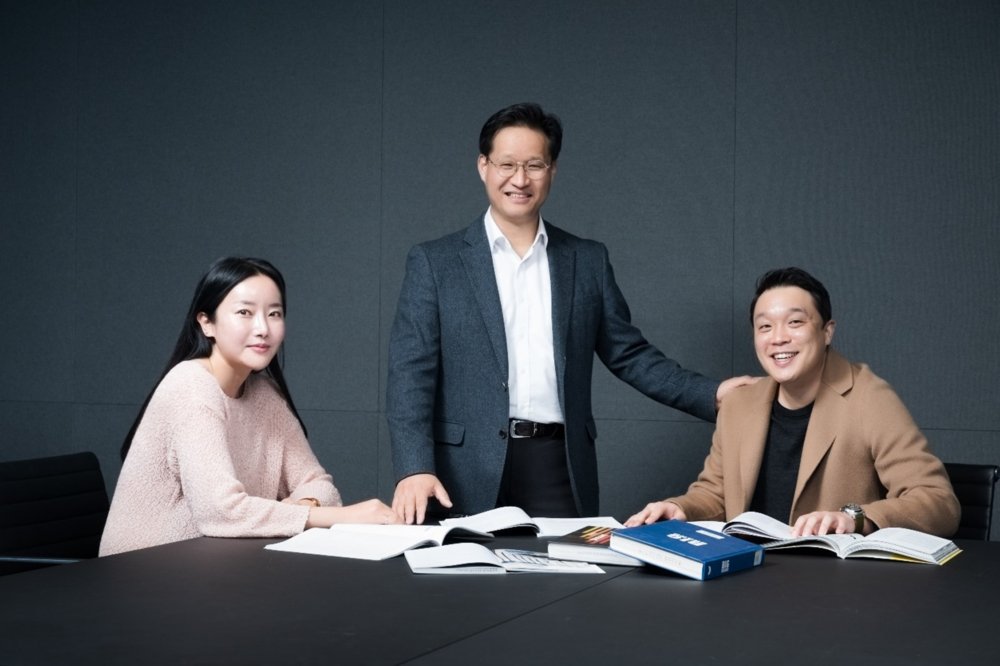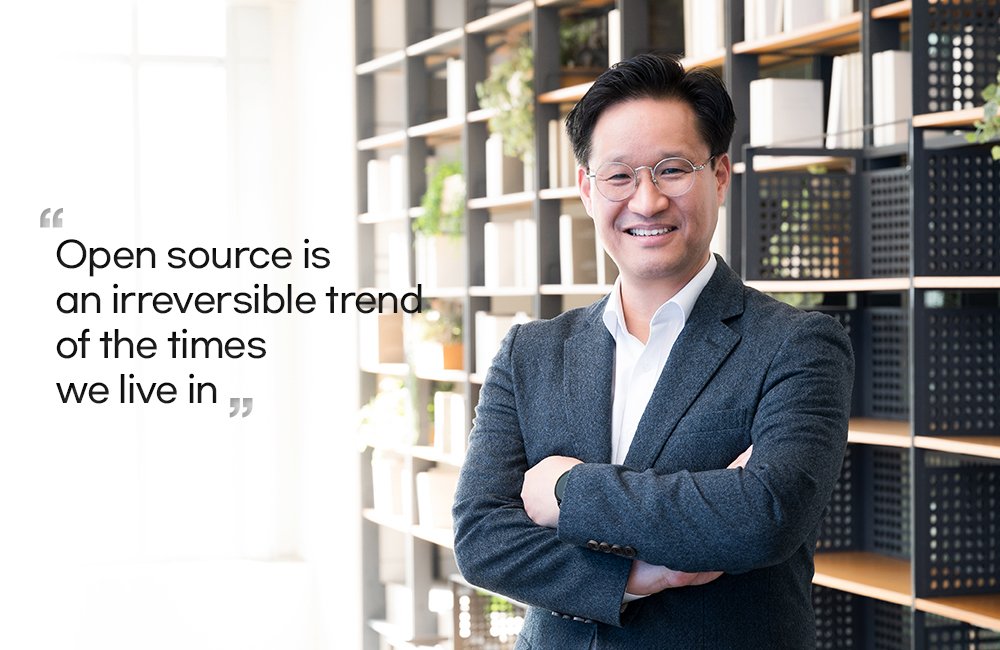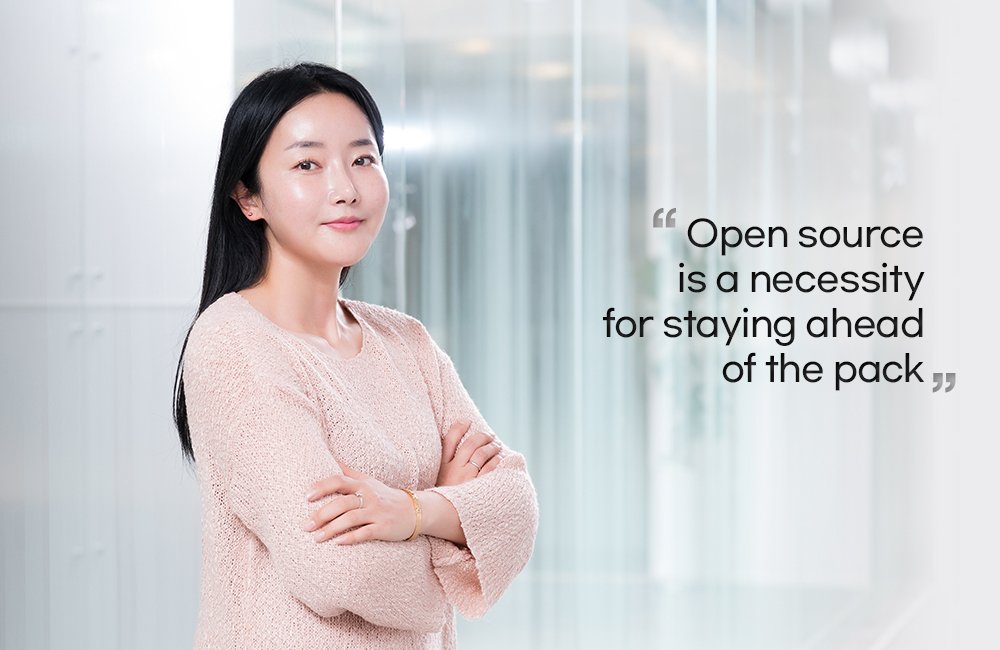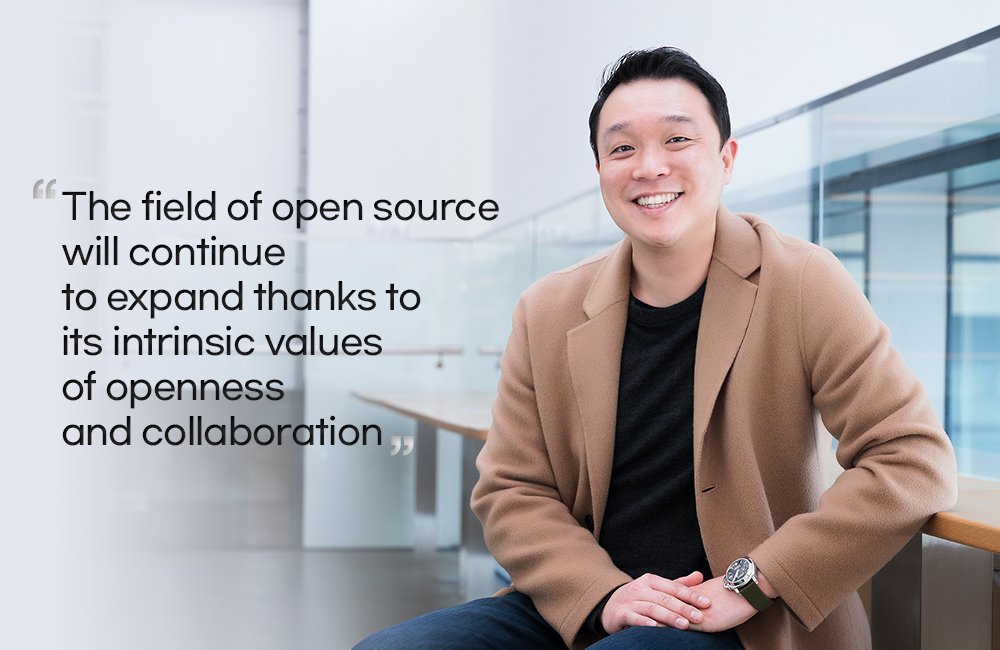There was a time when, by and large, companies that created software would closely guard what they had developed. Now, the software industry is driven by sharing and collaboration. It is becoming commonplace for companies to make their code open source and freely available to the public, which can result in their technology becoming the new standard.
Since 2013, Samsung Electronics has been a board member of the world’s largest open source community, the Linux Foundation. In addition, Samsung Research, the company’s advanced R&D hub, which leads the development of future technologies for its SET Business, has demonstrated its deep commitment to promoting the advancement of open source software by hosting its annual Samsung Open Source Conference (SOSCON) in Korea.

(From left) Samsung Research engineer Seo-Young ‘Isabelle’ Hwang, Senior Vice President and Head of R&D Strategy Team Seungbeom Choi and Engineer Yoonhwan Jung
What do the researchers leading open source development at Samsung Research think of the state of open source today? To find out, Samsung Newsroom invited Seungbeom Choi, Senior Vice President and Head of the R&D Strategy Team at Samsung Research, as well as Seo-Young Isabelle Hwang and Yoonhwan Jung, Engineers from Samsung Research’s Open Source Group, to take part in a wide-ranging and informative Q&A session.
Read on to find out what the experts asked one another, and what they see as the future of open source innovation.
Open Source Group Engineers’ Questions for Choi
Q: How would you define ‘open source’ in a single sentence?

Q: As the head of R&D Strategy team that leads Samsung’s open source research, open source is an integral part of your daily work. What were some of your first impressions of open source software?
In the course of advancing projects as the Head of Samsung Research’s R&D Strategy Team, I came to realize just how important of a role open source plays in advancing Samsung technologies, and saw it as something that we could not go against.
Q: You’ve referred to open source as being reflective of the times in which we live. Why do you believe open source innovation is so important?
When it comes to open source, there are two key benefits, per se. First and foremost, it allows you to access verified code for free. By making proprietary technologies open source, a company can establish itself as a standard-setter and technological leader. On top of that, open source competition – spanning areas such as mobile and IoT (the Internet of Things) in the past and, more recently, artificial intelligence (AI), robotics and advanced network technologies – is becoming progressively fiercer. This means that companies should not view an open source strategy as something that is nice to have, but that they must have.
Q: When did Samsung Electronics begin to take note of open source?
A number of companies have started to unveil proprietary open source technologies in an effort to take the lead in this particular area. In keeping with this trend, Samsung Electronics began to introduce its own open source technologies in the form of Tizen.
With Tizen coming along, Samsung went to great lengths to contribute to the open source community by establishing the Open Source Office, a specialized task force, and run open source educational programs for in-house developers. In 2013, Samsung created an organization dedicated to advancing open source overseas, and nurtured developers. Since 2014, Samsung has hosted SOSCON in Korea with a view toward fostering open source innovation locally. In all, Samsung has introduced over 130 open source projects, thereby playing a pivotal role in driving open source forward.
Q: With the field of open source development continuously expanding, it underlines a need for more bright minds. What makes for great talent in this area?
Open source is a relatively new field that encompasses a wide array of jobs spanning multiple areas, including development. With this in mind, I believe it is important for individuals to actively figure out what kind of role best suits their skills by taking on new tasks with confidence and not being afraid of failure.
Communication skills are especially important in this field. Open source is basically about sharing and collaboration, which means the ability to communicate effectively with businesses and third-party developers is a valuable skill. If you’re proactive about taking on tasks and you have great communication skills, you have the potential to become an open source specialist.
Q: We, too, hope that lots of great minds will be drawn to working in open source. What do you see as the future of software, and what role will Samsung Research play?
I cannot overstate just how integral software has become to our daily lives. ‘Solid’ software requires continuous commitment. As such, Samsung Research needs to play an active role in enhancing software’s capabilities long-term. Going forward, we will do our best to promote open source development and cooperation.
Choi’s Questions for Open Source Group Engineers

Q: In a nutshell, how would you sum up the Open Source Group?
I would say that working within the Open Source Group creates a window of opportunity. We’re tasked with handling a variety of jobs, including development, which enables us to obtain a wealth of experience and a level of expertise that makes us experts in our field. On top of that, open source is a very attractive field to me personally because it’s about driving technology forward based on open collaboration.
Q: As open source development entails great cost and commitment, some are not entirely convinced as to why we need to release software this way. How would you address those concerns?
When I first started working in open source, I received lots of questions asking why we needed to make technologies openly available. In fact, not every technology needs to be made available open source. There are time when you would choose to reveal a technology as part of a strategic move, but there are also times when you should keep the technology confidential for the sake of acquisition.
We especially need to make technologies available open source in cases where spreading those technologies will help us establish our leadership in a certain field. In line with these efforts, Samsung Electronics created IoTivity, an IoT-based open source project that’s part of the Open Connectivity Foundation (OCF) and features hundreds of member companies. If Samsung were the only company that possessed a certain IoT technology, the products we developed would not be compatible with those of other companies, and would therefore be less usable. This is why an open source approach is essential when it comes to spreading technologies and becoming the leader in a given field.
Q: Since 2013, the Open Source Group has been on the board of the Linux Foundation, the world’s largest open source organization. What led you to engage in such a collaboration?
The Linux Foundation is a not-for-profit organization that runs open source projects in a neutral manner. In 2012, Samsung Electronics introduced Tizen in cooperation with the Linux Foundation. Since then, Samsung has actively collaborated with the Foundation and proposed various projects.
In recognition of our significant contribution to the promotion of open source, we were invited to serve as a member of the Foundation’s board. Board members participate in the Foundation’s general affairs, encompassing tons of projects, and exercise voting rights when needed. This makes Samsung a major part of the board.

Q: With open source becoming the norm, more and more professionals are paying attention to this field. Would you recommend open source to them?
Absolutely! Open source experience is prized around the world, and serves as one of the most objective and reliable measurements of one’s software expertise. The Open Source Group is dedicated to developing its members into project leaders by offering them a variety of support. Not only does working in open source offer a great opportunity to boost your software skills, it also offers a chance to make your name known to the world.
Q: Do you believe, as I do, that open source is a very promising field?
Yes, I am with you. Open source is something that the industry takes for granted, and taking it to the next level will require us to focus not just on software but also hardware and data. This is because open source’s values of openness and collaboration are beginning to spread beyond individual companies.
Though their years of experience, fields and job titles differ, the experts unanimously agreed that open source is becoming wider in scope, and that sharing and collaboration will be key to developing technologies that truly benefit the future. After corresponding with one another, they emphasized their shared commitment to advancing open source for the betterment of society.
